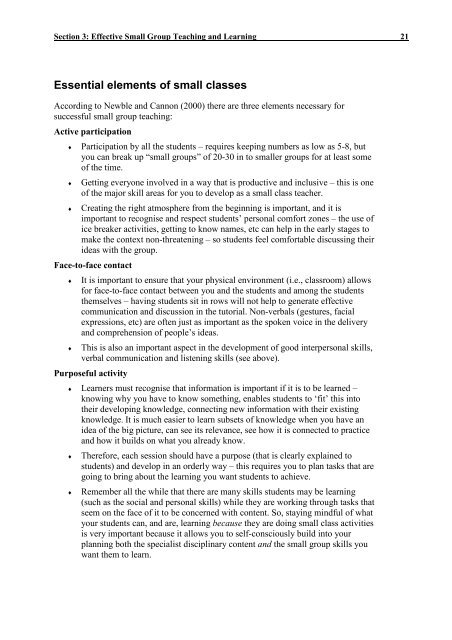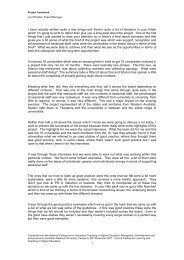A tutor's guide to teaching and learning at UQ - TEDI - University of ...
A tutor's guide to teaching and learning at UQ - TEDI - University of ...
A tutor's guide to teaching and learning at UQ - TEDI - University of ...
Create successful ePaper yourself
Turn your PDF publications into a flip-book with our unique Google optimized e-Paper software.
Section 3: Effective Small Group Teaching <strong>and</strong> Learning 21Essential elements <strong>of</strong> small classesAccording <strong>to</strong> Newble <strong>and</strong> Cannon (2000) there are three elements necessary forsuccessful small group <strong>teaching</strong>:Active particip<strong>at</strong>ion♦ Particip<strong>at</strong>ion by all the students – requires keeping numbers as low as 5-8, butyou can break up “small groups” <strong>of</strong> 20-30 in <strong>to</strong> smaller groups for <strong>at</strong> least some<strong>of</strong> the time.♦♦Getting everyone involved in a way th<strong>at</strong> is productive <strong>and</strong> inclusive – this is one<strong>of</strong> the major skill areas for you <strong>to</strong> develop as a small class teacher.Cre<strong>at</strong>ing the right <strong>at</strong>mosphere from the beginning is important, <strong>and</strong> it isimportant <strong>to</strong> recognise <strong>and</strong> respect students’ personal comfort zones – the use <strong>of</strong>ice breaker activities, getting <strong>to</strong> know names, etc can help in the early stages <strong>to</strong>make the context non-thre<strong>at</strong>ening – so students feel comfortable discussing theirideas with the group.Face-<strong>to</strong>-face contact♦ It is important <strong>to</strong> ensure th<strong>at</strong> your physical environment (i.e., classroom) allowsfor face-<strong>to</strong>-face contact between you <strong>and</strong> the students <strong>and</strong> among the studentsthemselves – having students sit in rows will not help <strong>to</strong> gener<strong>at</strong>e effectivecommunic<strong>at</strong>ion <strong>and</strong> discussion in the tu<strong>to</strong>rial. Non-verbals (gestures, facialexpressions, etc) are <strong>of</strong>ten just as important as the spoken voice in the delivery<strong>and</strong> comprehension <strong>of</strong> people’s ideas.♦This is also an important aspect in the development <strong>of</strong> good interpersonal skills,verbal communic<strong>at</strong>ion <strong>and</strong> listening skills (see above).Purposeful activity♦ Learners must recognise th<strong>at</strong> inform<strong>at</strong>ion is important if it is <strong>to</strong> be learned –knowing why you have <strong>to</strong> know something, enables students <strong>to</strong> ‘fit’ this in<strong>to</strong>their developing knowledge, connecting new inform<strong>at</strong>ion with their existingknowledge. It is much easier <strong>to</strong> learn subsets <strong>of</strong> knowledge when you have anidea <strong>of</strong> the big picture, can see its relevance, see how it is connected <strong>to</strong> practice<strong>and</strong> how it builds on wh<strong>at</strong> you already know.♦♦Therefore, each session should have a purpose (th<strong>at</strong> is clearly explained <strong>to</strong>students) <strong>and</strong> develop in an orderly way – this requires you <strong>to</strong> plan tasks th<strong>at</strong> aregoing <strong>to</strong> bring about the <strong>learning</strong> you want students <strong>to</strong> achieve.Remember all the while th<strong>at</strong> there are many skills students may be <strong>learning</strong>(such as the social <strong>and</strong> personal skills) while they are working through tasks th<strong>at</strong>seem on the face <strong>of</strong> it <strong>to</strong> be concerned with content. So, staying mindful <strong>of</strong> wh<strong>at</strong>your students can, <strong>and</strong> are, <strong>learning</strong> because they are doing small class activitiesis very important because it allows you <strong>to</strong> self-consciously build in<strong>to</strong> yourplanning both the specialist disciplinary content <strong>and</strong> the small group skills youwant them <strong>to</strong> learn.



